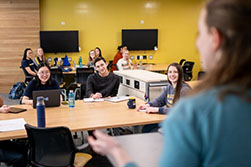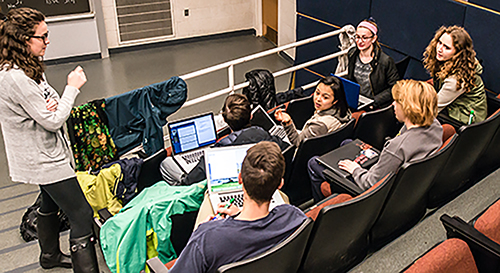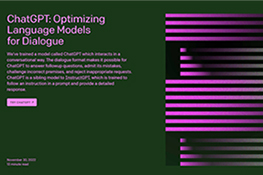| Lecture capture: A meaningful resource for learning Tue, 10/05/2021
Concerns about the effects of lecture capture on attendance and learning have existed since its inception. While some studies find that lecture attendance does indeed decrease slightly when lecture capture is introduced, many others show no significant effects. The relationship between lecture capture, attendance and student achievement is complex and shows different patterns for different groups of students (e.g. Banerjee, 2020). Read more |
| Using Groups and Teams in Teaching: New CRLT Resources Mon, 09/13/2021
Questions such as these arise regularly in consultations with U-M instructors who are implementing group work in their courses. Drawing on these experiences and the research on best practices, CRLT has created a new webpage, Introduction to Groups and Teams. It is designed to be a valuable starting point for instructors to consider as they add or revise group assignments and activities to their courses. The site includes information and resources on the following topics: Read more |
| Navigating the Return to In-Person Teaching Mon, 08/23/2021
At the same time, we have heard from instructors that remote teaching led them to new insights and improved practices, which they plan to maintain in the in-person setting. This blog is designed to bring together insights from U-M students and instructors, as well as national and U-M resources, and provide suggestions for successfully navigating the unique circumstances of this term. CRLT consultants are glad to meet with you about any aspect of your teaching. We will hold daily office hours via Zoom, and you can sign up for an individual consultation on the CRLT website. Read more |
| CRLT Spring/Summer Services Wed, 06/02/2021
Read more |
| New Video on Teaching for Equity: U-M Faculty Perspectives Thu, 04/29/2021 This week, CRLT kicks off our Inclusive Teaching at Michigan 2021 May Series. Our theme for this year, "Widening the Lens: Equity Focused Teaching," emphasizes the need for instructors to more clearly focus on developing an equity-driven teaching practice. We will offer a range of workshops designed to help U-M instructors think beyond inclusion in order to explore and develop equity-focused commitments and practices in their teaching. Register now to attend some or all of the workshops in the series. Read more |
| An Invitation to the 2021 Inclusive Teaching @ Michigan series: Widening the Lens: Equity Focused Teaching Tue, 04/06/2021 Click HERE to register for the 2021 Inclusive Teaching @ Michigan series.
Read more |
| Helping Students Navigate Ramadan and Final Exams Tue, 03/16/2021
Read more |
| Promoting the Success of Students Who Are Parents Mon, 01/25/2021 By: Lyss Shumaker In this guest post, our partners from the Student Parent Excellence Committee offer key insights into the experiences of student parents and strategies that can be applied in the classroom to support their excellence. To learn more about this cross-campus committee, please visit: http://www.cew.umich.edu/advocacy-initiatives/student-parents/
During the Covid-19 pandemic, many instructors have found themselves balancing a disproportionate workload, where the intersection of work and personal boundaries are blending together. The current remote learning landscape has also given instructors a window into students’ lives and the complex commitments they are balancing–especially those with caregiver responsibilities, including parents. Based on financial aid data alone, we know that there are over 700 student parents actively enrolled at U-M. This blog post will provide context for the challenges student parents face in the classroom and strategies for how you can support the learning of student parents enrolled in your courses. Read more |
| The U.S. Presidential Inauguration: Teaching Strategies and Resources Wed, 01/13/2021  As our campus prepares to begin the Winter 2021 semester, the country prepares for the inauguration of its 46th President. The inauguration often signals the closure of our election season for at least another two years. This year, however, the inauguration comes as one more uncertain and potentially volatile event in an election season marked by unprecedented attacks on our democratic processes. The most recent example of this was the violent and unnerving disruption of the ratification proceedings on January 6th. Though the mob ultimately failed to alter the results of those proceedings, it succeeded in further amplifying the white nationalist, anti-Semitic, xenophobic, and anti-Black politics and actions that have profoundly shaped this election season. The attack on the capitol hangs heavy for many as we approach the inauguration on January 20th. At CRLT, we want to acknowledge more specifically that events such as the attack on the capitol and upcoming inauguration are important context for the beginning of the Winter 2021 semester and are likely shaping the expectations and plans of students and instructors as you prepare to re-enter the classroom. We share this brief blog post to encourage you to keep the following in mind as you finish final preparations for your courses: As our campus prepares to begin the Winter 2021 semester, the country prepares for the inauguration of its 46th President. The inauguration often signals the closure of our election season for at least another two years. This year, however, the inauguration comes as one more uncertain and potentially volatile event in an election season marked by unprecedented attacks on our democratic processes. The most recent example of this was the violent and unnerving disruption of the ratification proceedings on January 6th. Though the mob ultimately failed to alter the results of those proceedings, it succeeded in further amplifying the white nationalist, anti-Semitic, xenophobic, and anti-Black politics and actions that have profoundly shaped this election season. The attack on the capitol hangs heavy for many as we approach the inauguration on January 20th. At CRLT, we want to acknowledge more specifically that events such as the attack on the capitol and upcoming inauguration are important context for the beginning of the Winter 2021 semester and are likely shaping the expectations and plans of students and instructors as you prepare to re-enter the classroom. We share this brief blog post to encourage you to keep the following in mind as you finish final preparations for your courses:Read more |
| Fall 2020 Course Evaluations: Creating Useful Questions Fri, 11/06/2020
In this blog post, we review the university-wide questions that appear on end-of-semester evaluations, as well as those added for Fall 2020 in particular, and we offer guidance on how to make the most of instructor-created questions. These principles can also be used to create questions for feedback that you collect at other times of the semester. In addition, this previous CRLT blog post provides strategies for increasing student response rates, and this Registrar's site contains details about the course evaluation process. Read more |


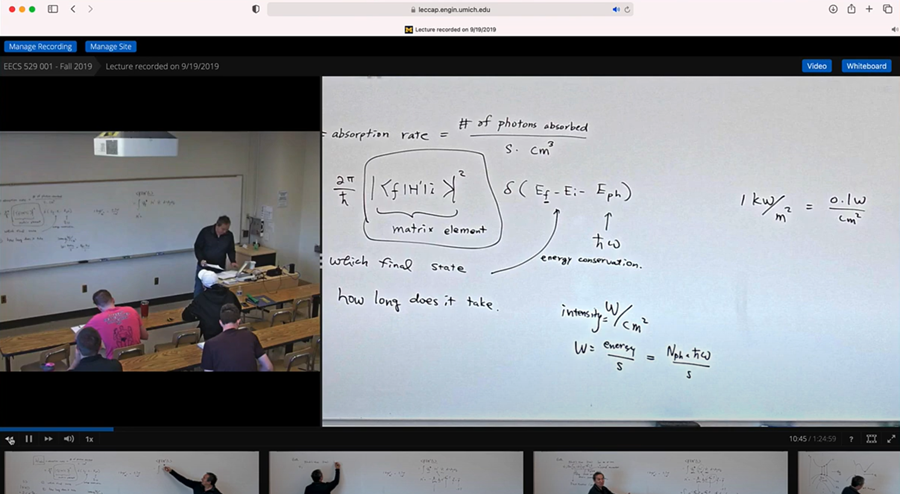 Still in the midst of a pandemic, you may be wrestling with the question of whether or not to record your lectures. On the one hand, recordings provide a simple way for students to catch up if they become sick. On the other hand, you may worry about student learning or about teaching in an almost empty classroom. You are not alone.
Still in the midst of a pandemic, you may be wrestling with the question of whether or not to record your lectures. On the one hand, recordings provide a simple way for students to catch up if they become sick. On the other hand, you may worry about student learning or about teaching in an almost empty classroom. You are not alone.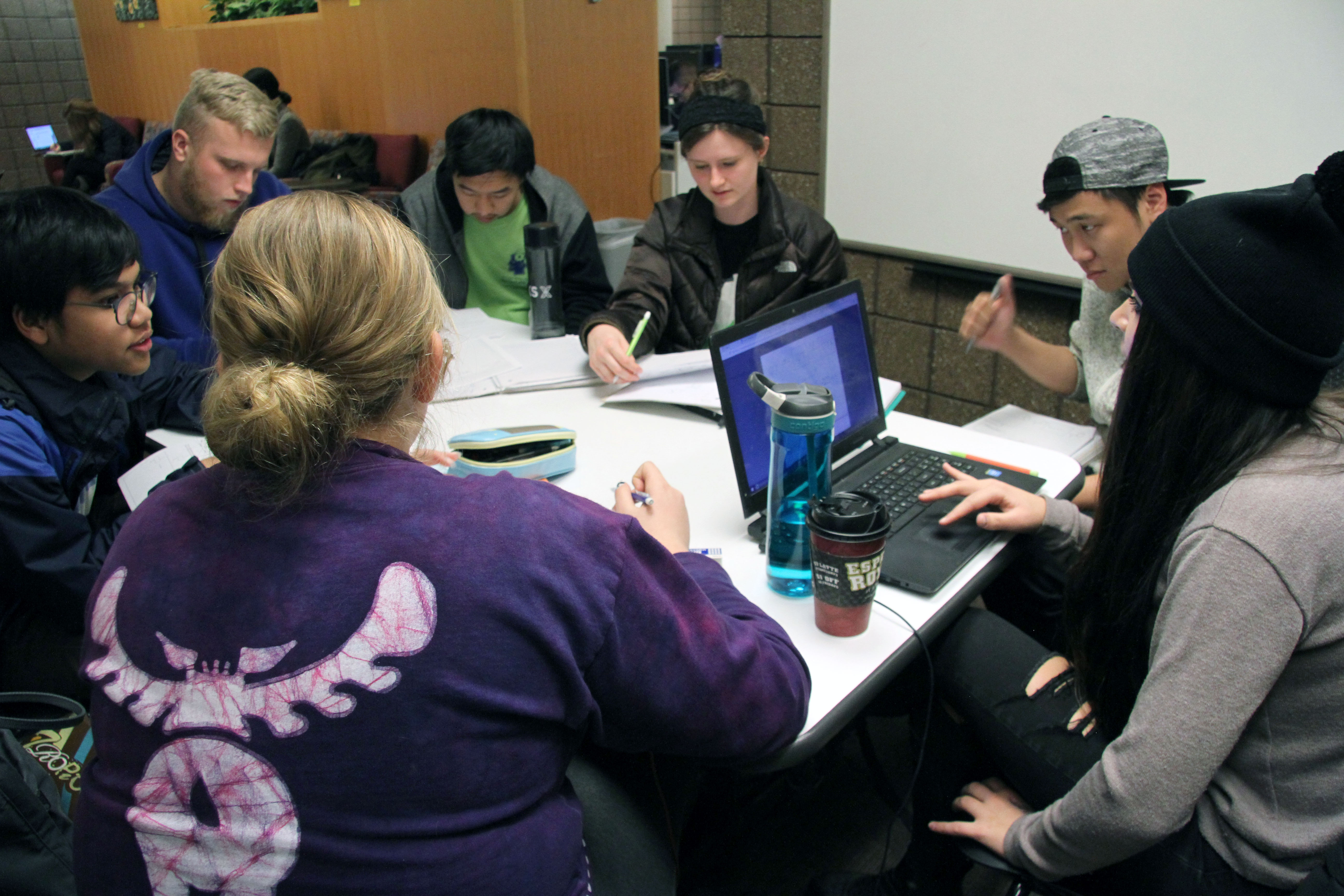 What are the benefits of collaborative learning? What are best practices for forming teams? How can I promote effective group dynamics? And, how do I hold students accountable in this learning context?
What are the benefits of collaborative learning? What are best practices for forming teams? How can I promote effective group dynamics? And, how do I hold students accountable in this learning context?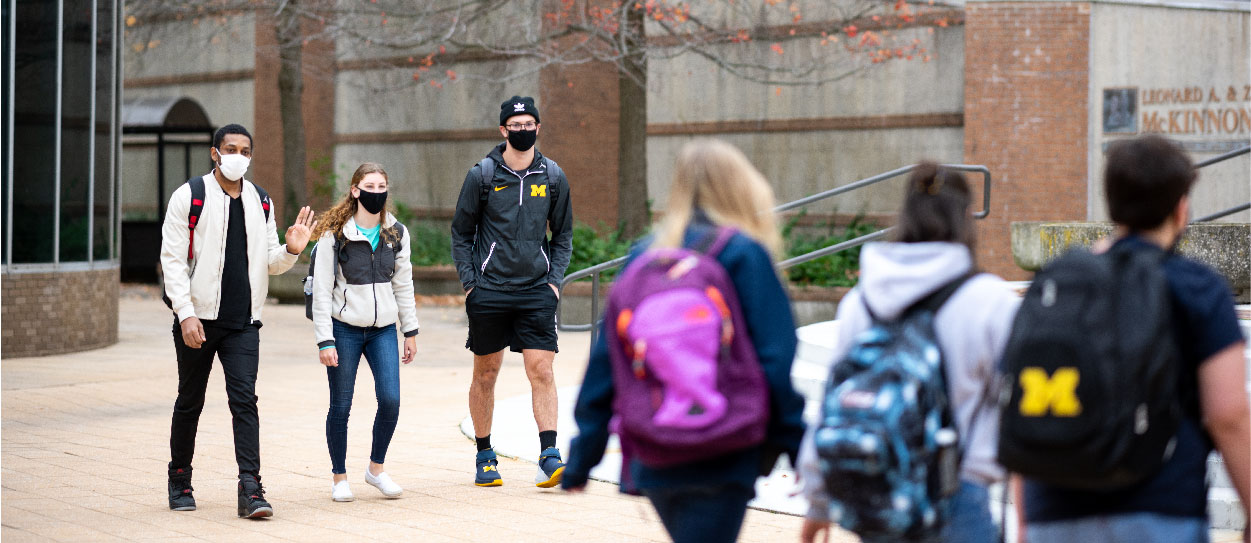 As the fall term begins, instructors and students are returning to campus in ways that will be both familiar and unique. While a very high percentage of classes will be offered in person (over 97% in LSA), we continue to grapple with the delta variant of the coronavirus, and masks will be mandatory for everyone in classrooms across U-M. For many continuing students, and for those just starting their first year (including instructors), Fall 2021 will be their first experience with in-person teaching and learning since March 2020. While first- and second-year students will have no experience with fully in-person classes, even juniors will have had only one fully uninterrupted semester.
As the fall term begins, instructors and students are returning to campus in ways that will be both familiar and unique. While a very high percentage of classes will be offered in person (over 97% in LSA), we continue to grapple with the delta variant of the coronavirus, and masks will be mandatory for everyone in classrooms across U-M. For many continuing students, and for those just starting their first year (including instructors), Fall 2021 will be their first experience with in-person teaching and learning since March 2020. While first- and second-year students will have no experience with fully in-person classes, even juniors will have had only one fully uninterrupted semester. Is CRLT still available to support U-M instructors during the summer? Indeed, we are! Whether you want to discuss need to reimagine your course or modify an already flexible design, CRLT is here to support you with a range of services as you plan for Fall 2021, including the following:
Is CRLT still available to support U-M instructors during the summer? Indeed, we are! Whether you want to discuss need to reimagine your course or modify an already flexible design, CRLT is here to support you with a range of services as you plan for Fall 2021, including the following: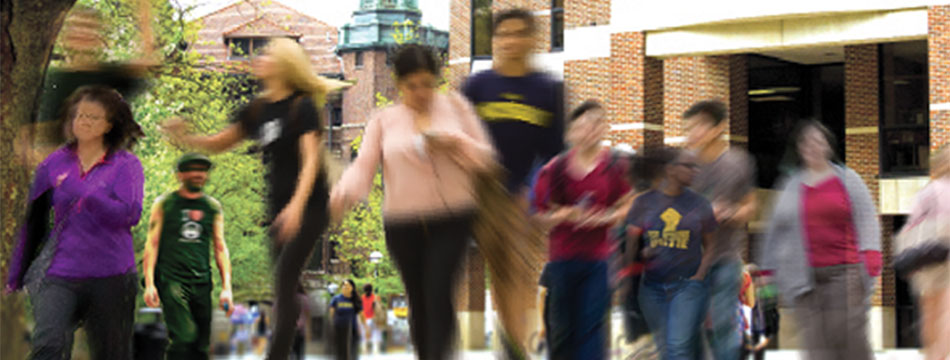 In light of the disruptions that have characterized the year, including a global pandemic, civil and political unrest, racial reckoning, and widespread shifts to remote teaching and learning, the need to widen our lens from inclusion to a more equity-focused view of teaching and learning has become all the more evident and urgent. At CRLT, we have found ourselves asking a range of questions to help us move toward more equitable practices, including ones aimed at reevaluating our framework for inclusive teaching. While inclusive teaching practices are important, they often don’t foreground larger systems of inequity (e.g., racism, classism, sexism, ableism, heterosexism, nativism, etc.). Without explicit attention to the impact of systemic inequity, inclusion efforts can approach all forms of student difference as equal and often ignore the specific social and political conditions that shape our students’ experiences in the classroom differently. For example, instructors are frequently encouraged to include all students or all voices in the classroom, without also being asked to consider which voices have been persistently excluded or marginalized within and beyond the classroom.
In light of the disruptions that have characterized the year, including a global pandemic, civil and political unrest, racial reckoning, and widespread shifts to remote teaching and learning, the need to widen our lens from inclusion to a more equity-focused view of teaching and learning has become all the more evident and urgent. At CRLT, we have found ourselves asking a range of questions to help us move toward more equitable practices, including ones aimed at reevaluating our framework for inclusive teaching. While inclusive teaching practices are important, they often don’t foreground larger systems of inequity (e.g., racism, classism, sexism, ableism, heterosexism, nativism, etc.). Without explicit attention to the impact of systemic inequity, inclusion efforts can approach all forms of student difference as equal and often ignore the specific social and political conditions that shape our students’ experiences in the classroom differently. For example, instructors are frequently encouraged to include all students or all voices in the classroom, without also being asked to consider which voices have been persistently excluded or marginalized within and beyond the classroom.  While final exams are a stressful time for all U-M students, in the Winter 2021 semester, Muslim students will face an additional set of challenges. This year, the Muslim holiday of Ramadan will fall during finals (the full holiday runs from April 13-May13), and students observing the holiday will be fasting from dawn to sunset. For many students this entails maintaining concentration and energy for exams that might fall late in the afternoon after waking up before dawn to have an early meal; having to postpone breaking the fast until after taking a late exam; or losing sleep while studying late into the night after breaking the fast.
While final exams are a stressful time for all U-M students, in the Winter 2021 semester, Muslim students will face an additional set of challenges. This year, the Muslim holiday of Ramadan will fall during finals (the full holiday runs from April 13-May13), and students observing the holiday will be fasting from dawn to sunset. For many students this entails maintaining concentration and energy for exams that might fall late in the afternoon after waking up before dawn to have an early meal; having to postpone breaking the fast until after taking a late exam; or losing sleep while studying late into the night after breaking the fast.
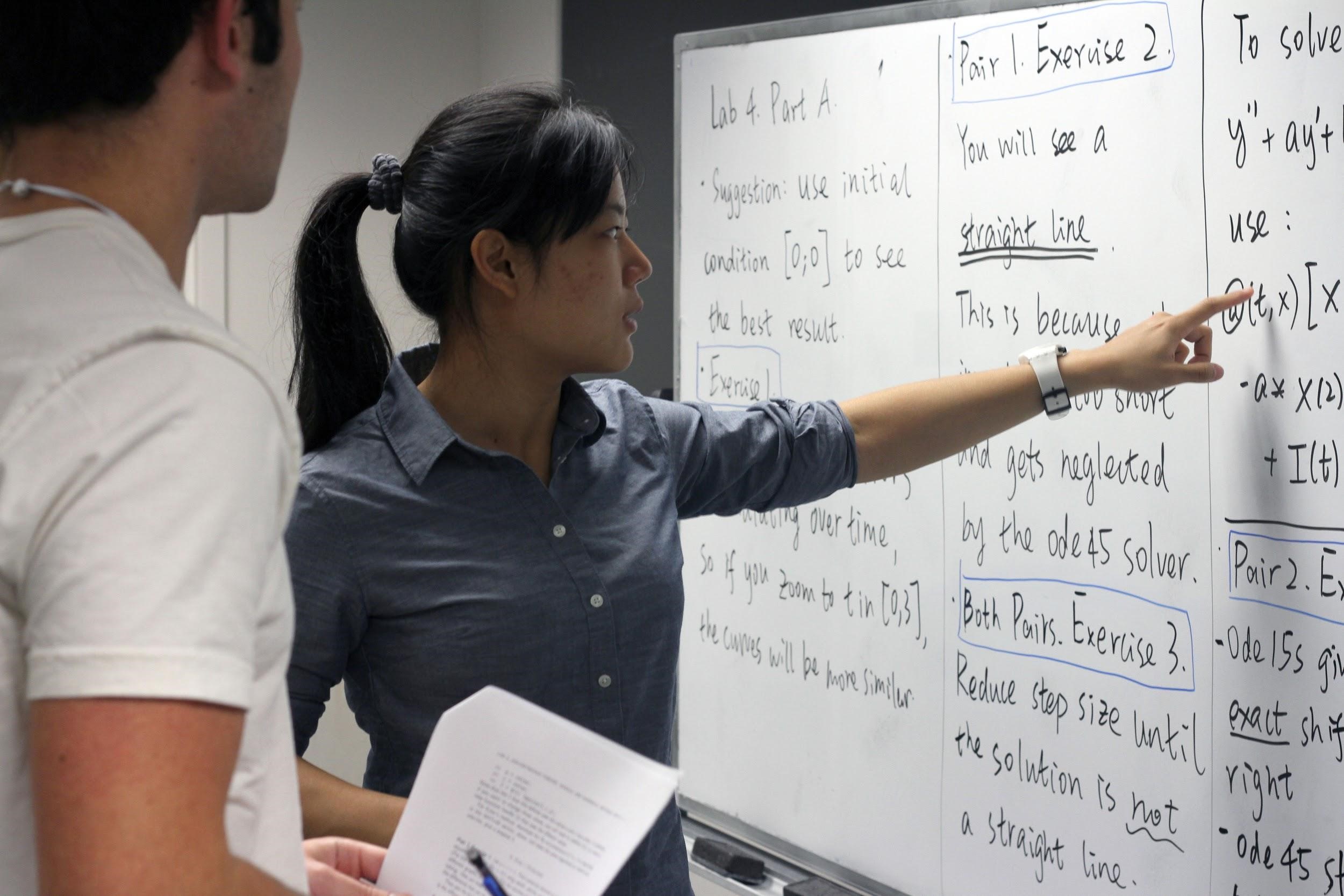 As we pass the middle of the term, instructors are asked to think about course evaluations that students complete at the end of the term (November 19-December 9). By November 17, U-M instructors are invited to preview evaluation questions and create a few of their own if they wish. What principles or goals might guide you in that process?
As we pass the middle of the term, instructors are asked to think about course evaluations that students complete at the end of the term (November 19-December 9). By November 17, U-M instructors are invited to preview evaluation questions and create a few of their own if they wish. What principles or goals might guide you in that process?
